 Image search results - "Aichi" Image search results - "Aichi" |
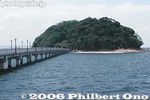
Takeshima island is connected by a bridge. The island is uninhabited, but has a Yaotomi Jinja Shinto shrine (八百富神社) dedicated to goddess Takeshima Benten. Designated as a Natural Monument for its flora which greatly differs from that on shore.
|
|

Sign for boat going to the islands (no longer in service)
|
|

Okazaki Castle towerThe castle was dismantled during the Meiji Period and the area was made into a castle park. The castle tower was later rebuilt in 1959.
|
|

Inuyama Yuen Station. Closest station to Inuyama Castle on the Meitetsu Line.
|
|

Road to Inuyama Castle
|
|
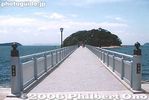
400-meter long bridge to Takeshima island near JR Gamagori Station. The island is made of granite. Circumference is 680 meters. There's a walking path around the island.
|
|

Rabbit Island
|
|
|

Kiso River with Inuyama Castle in the distance
|
|

Inuyama Cultural History Museum犬山市文化史料館
|
|
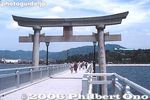
Torii on Takeshima island
|
|

Rabbits
|
|
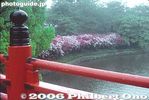
Bridge and azaleas
|
|

Inuyama Castle
|
|

Karakuri Doll Museumからくり展示館
|
|

My bicycle somewhere in Gamagori.
|
|

Feeding a rabbit
|
|
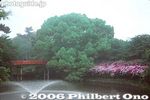
Azaleas
|
|

Inuyama Castle
|
|

Karakuri Doll MuseumThe karakuri dolls, set atop ornate floats, are controlled with strings.
|
|

JR Gamagori Station. In the foreground is my bicycle.
|
|

Rabbit Island
|
|

Bridge to caslte
|
|

Haritsuna Shrine
|
|

Entrance to Urakuen GardenThis garden has a few tea houses including one called Jo-an, a National Treasure. THe garden is close to Inuyama Castle and worth a visit. Admission 1,000 yen.
有楽苑
営業時間 9:00〜17:00(3/1〜7/14 ・ 9/1〜11/30)
9:00〜18:00(7/15〜8/31)
9:00〜16:00(12/1〜2/末日)
休日 無休 入場料 大人1,000円(呈茶別500円)
〒484−0081
愛知県犬山市御門先1
TEL 0568(61)4608
交通 名鉄犬山線犬山遊園下車徒歩7分
|
|

View from Rabbit Island
|
|

Wisteria
|
|

Sanko Inari ShrineThe shrine provides a short cut to the castle.
|
|

Urakuen Garden水琴窟
|
|
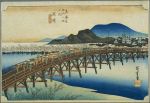
Hiroshige's woodblock print of Okazaki (39th post town on the Tokaido) from his "Fifty-Three Stations of the Tokaido Road" series. Crossing the Yahagi River with Okazaki Castle in the distance.
|
|

Boat to Rabbit and Monkey islands (no longer in service)
|
|

Steps to castle gate
|
|

Urakuen Garden tea ceremony house
|
|

Monkey Island (Sarugashima)
|
|

Steps to castle gate
|
|

Inside Jo-an tea ceremony house, a National Treasure
|
|
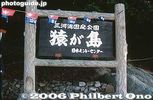
Monkey Island (Sarugashima)
|
|

Reconstructed Honmaru Gate
|
|

Jo-an tea ceremony house, a National Treasure. Built in 1618 by Oda Uraku, one of the greatest tea ceremony masters and younger brother of warlord Oda Nobunaga.Jo-an is one of Japan's three most famous tea ceremony houses. 如庵
|
|

Monkeys
|
|

Inuyama Castle tower
|
|
|

Mt. Fuji as seen from the train on the Itsukaichi Line in Akiruno.
|
|

Konomiya Shrine holds the Hadaka (Naked or Nude) Festival in early March, or Jan. 13 of the lunar calendar. Men in loincloths parade around the streets until they reach the shrine.A Sacred Man (Shin-otoko) also appears in the shrine and the men try to touch him before he slips into the shrine's window. The festival's real name is Naoi-shinji 儺追神事 which is a rite to dispel bad luck. Photo: Nearest station is JR Inazawa Station on the Tokaido Line. 稲沢駅
|
|

Way to Tagata Shrine from Tagata Jinja-mae Station. Shrine famous for numerous phallic objects used as offerings to the gods. The 1500-year-old shrine worships a deity called Tamahime-no-Mikoto who was a daughter of a powerful local lord from the 5th c.The Honen-sai or Honen (Hounen) Matsuri is held by Tagata Jinja on March 15 to pray for an abundant harvest. "Honen" literally means "Year of abudant harvest." Since a giant penis is used as an offering, it is popularly called the "penis festival."
The shrine is near Tagata Jinja-mae Station on the Meitetsu Railways' Komaki Line. From Shin-Nagoya Station or Shin-Gifu Station, go to Inuyama Station and transfer to the Komaki Line.
|
|

Tagata Jinja-mae Station on Meitetsu Railways' Komaki Line, a few stops from Inuyama Station. The shrine is a 10 min. walk from the train station.
|
|
|

Castle tower
|
|

Tea ceremony house
|
|

Approaching Musashi-Itsukaichi Station
|
|

A group of men carry a red and white pole in front of Inazawa Station, on their way to Konomiya Shrine.
|
|

Festival spectators come by the busload, including people from US military bases such as Yokota.
|
|

Tagata Shrine torii and entrance 田縣神社
|
|

Inuyama CastleNational Treasure
|
|

Inside tea ceremony house
|
|

Approaching Musashi-Itsukaichi Station
|
|

Raising a pole in front of Inazawa Station
|
|

Entering Tagata Shrine, dedicated to Tamahime-no-Mikoto (daughter of a local feudal lord) and Mitoshi-no-Kami (deity of harvests).
|
|

Tagata Shrine stone marker
|
|

Castle tower entrance
|
|

JR Musashi-Itsukaichi Station on the Itsukaichi Line
|
|

Raising a pole in front of Inazawa Station
|
|

Various entertainment is staged within Tagata Shrine up until the procession starts at 2 pm.
|
|

Mikuji paper fortunes for love and romance, marriage, and childbirth.
|
|

Inside entrance
|
|

JR Musashi-Itsukaichi Station on the Itsukaichi Line
|
|
|

Schedule of events and procession route. In odd-numbered years (like 2007), the procession starts from nearby Kumano-sha Shrine. In even-numbered years, the procession starts from Shinmei-sha Shrine.
|
|

Tagata Shrine Honden main hall. Komaki, Aichi Pref.
|
|

More stairs
|
|

In front of JR Musashi-Itsukaichi Station
|
|

They zig-zag along the street, and they are filled with sake.
|
|

People line up to rub the sacred balls. Penis rock in the foreground.
|
|

Tagata Shrine Honden main hall which worships shrine worships a deity called Tamahime-no-Mikoto who was a daughter of a powerful local lord from the 5th century.
|
|
|

In front of JR Musashi-Itsukaichi Station (bus stops)
|
|
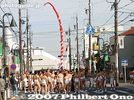
Every once in a while, they raise their pole.
|
|

Sacred Balls. Put in money and rub the left and right ball for family safety, business prosperity, safe childbirth, etc. 珍宝窟
|
|

Torii to Oku-no-miya Shrine, next to the Honden main hall.
|
|

Very steep
|
|
|
|
|

Stones and Oku-no-miya Shrine
|
|
|

On the straight road from Inazawa Station to Konomiya Shrine.
|
|

Torii gate to Kumano-sha Shrine.
|
|

Inside castle tower
|
|
|

Kumano-sha Shrine, the starting point of the procession or "Penis Parade." 熊野社
|
|

This is what you see inside Oku-no-miya Shrine. A giant wooden phallus offering.
|
|
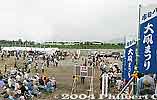
I saw the Yokaichi Giant Kite Festival (Odako Matsuri) for the first time on May 23, 2004. The site is alongside the Echigawa River near the Yachiyo Bridge. A free shuttle bus from Yokaichi Station is provided, taking about 10 min.
|
|
|
|
|

Road to Ooagata (Oagata) Shrine, famous for worshipping a rock shaped like the female sexual organ. It also holds the Honen Matsuri for a good harvest and fertility on the Sunday before March 15. 大県神社The shrine is the female counterpart to Tagata Shrine which worships the phallus in neighboring Komaki. The shrine is also noted for weeping plum blossoms.
|
|

Inside Kumano Shrine. Notice the wooden penises on lower left.
|
|

Oku-no-miya Shrine also has many other phallic objects presented as offerings. There even one which you can touch...
|
|
|
|

Konomiya Shrine torii and the long path to the shrine is lined with a large crowd.
|
|

Oagata Shrine torii
|
|

Apparently it can become erect too. (Compare with previous photo.)
|
|

Portable shrine for Takeinadane-no-Mikoto who was a local prince married to Tamahime which Tagata Shrine worships.
|
|

Top floorThe top floor was called the Koran Room.
高欄の間
|
|

Numerous groups of near-naked men (no women) proceed to the shrine all afternoon.
|
|

Honen Matsuri Festival banner depicting Hime-no-miya
|
|

Phallic objects
|
|

The second portable shrine and main attraction. It is 2.5 meters (13 feet) long, 60 cm diameter, and weighs about 300 kg. It takes 10 days to carve it from a cypress log.
|
|

Portraits of castle lords and owners on top floorEleven generations of the Naruse Clan are shown here.
|
|
|

Honen Matsuri Festival banner disguising the female organ.
|
|

Front view. A new giant, wooden phallus is carved every year since newly-made objects are considered to have more purity and vitality.
|
|

Note that the phallus is not the object of worship. It is an offering to the god.
|
|
|

Zig-zag to the shrine
|
|

Ooagata Shrine grounds
|
|

It might look light brown here, but it looks more pinkish. It is carved in winter from a hinoki cypress tree by a master artisan wearing ceremonially-purified clothing and using traditional tools.
|
|
|

Top floor verandaThe fence is quite low and anyone can easily fall over...
|
|
|
|

Votice tablets written with people's wishes for love, sex, and babies.
|
|

Maiden poses with the giant penis. In the past, the phallus was attached to a straw effigy of a warrior, but it was deemed too raunchy and discontinued.
|
|

View of Kiso River
|
|

Another torii
|
|
|

Conch shell
|
|

Place to rub the sacred balls. 珍宝窟
|
|

Veranda
|
|
|
|
|

Banner with ukiyoe shunga-style painting of a penis.
|
|
|

View of castle grounds
|
|
|
|

Himenomiya Shrine 姫之宮
|
|

Another mikoshi with a wooden penis. For a good harvest.
|
|
|

Kiso River
|
|

Romon Gate 楼門
|
|

Himenomiya Shrine 姫之宮
|
|

Nose jobI didn't see this among the souvenirs being sold. Wonder where he got it.
|
|

Rub the two balls.
|
|

Crowds
|
|

Inuyama Castle roof
|
|

After passing through this gate, the men enter the shrine grounds. Romon Gate 楼門
|
|

Hime-no-miya Shrine 姫之宮
|
|

Procession maidens pose with wooden penises. Tagata Shrine Honen Festival
|
|

Put in money and it will make a "chin" sound. (From the word "chinpo" for penis.)
|
|
|

Haiden Hall where the men offer their long poles. 拝殿
|
|

On the right of Himenomiya Shrine, is a narrow, non-descript path going to the rear.
|
|

Procession maidens pose with wooden penises.
|
|

Phallic fence posts.
|
|
|
|

Haiden Hall 拝殿
|
|

There it is. The female rock. 女性器をかたどった石
|
|
|
|
|
|

Now empty, this path will soon be filled with thousands of men in loincloths.
|
|

「姫石」(陰石)
|
|
|
|

Phallic rock. There are several phallic rocks donated by various people. Apparently they are either natural or carved.
|
|
|

Some of the men tear off strips from their handband and give them to bystanders.
|
|

Oagata Shrine's Female Rock. 女性器をかたどった石
|
|

Lots of people pose with the giant penis. Amid hordes of amateur photographers
|
|

Best-looking phallic rock.
|
|

Castle photo exhibition
|
|

Gaijin talking to gaijin. Sounded Australian. English teacher at junior high.
|
|

Oagata Shrine's Female Rock. Not a good likeness...「姫石」(陰石)
|
|

Many foreigners also join in the fun. The giant phallus was originally about 1 meter long and paraded by itself by 4-5 people with no portable shrine shelter.
|
|
|
|
|

Gaijin girls had an easy time attracting men who happily tried to converse in English and bestow cloth strips.
|
|

More female rocks.
|
|

Procession maidens pose with the giant penis. The giant phallus was then partially hidden by the portable shrine as it is today. But this made the phallus become larger to 2.5 meters, as if to compensate for this partial shielding.
|
|

Female and male rocks.
|
|
|

The inner path to the shrine gets more crowded.
|
|

Female Rock
|
|

Palanquin maidens.
|
|

Behind the rocks are two trees bonded together.
|
|
|

It was a pretty cold day, and these men were drinking all afternoon.
|
|
|
|

Gozensai ceremony before the start of the procession.
|
|

Another pair of trees bonded together.
|
|
|
|
|
|

Gozensai prayer ceremony before the start of the procession.
|
|

And another...
|
|

Mini kite contest. Kite contestants show off their kite designs at their tents.
|
|
|

Meitetsu Inuyama Station, west entrance
|
|
|

Mini torii. Pay money to crawl under the torii (looks like only a child can do it) for good luck.
|
|

Gozensai ceremony before the start of the penis procession. Tagata Shrine Honen Matsuri
|
|
|

Lord's Room (Jodan no Ma)This room was used by the castle lord.
|
|

Meitetsu Inuyama Station, east entrance
|
|

Banzai cheers when an extra-large pole was brought to the shrine.
|
|

Daikoku Ebisu Shrine 大黒恵比須神社
|
|

The short prayer ceremony ends.
|
|
|
|

O-sugisama Sacred Cedar TreeThis tree existed even before the castle was built over 650 years ago. It stood 24 meters tall, higher than the castle tower. It absorbed hits by lightning in place of the castle and also protected the castle tower from high winds. The tree then came to be worshipped as castle guardian.
The tree was severely damaged during the Ise-wan typhoon in 1959, and died in 1965.
|
|

Inuyama International Sightseeing Center "Freude" 犬山国際観光センター“フロイデ”Near Meitestu Inuyama Station, a community center for international exchange, sports, and cultural activities.
犬山国際観光センター“フロイデ”
|
|

Stacking up the poles.
|
|

Daikoku Ebisu Shrine 大黒恵比須神社
|
|

Mikoshi (portable shrine) bearers gather in front of Kumano Shrine.
|
|

Worst-looking phallic rock. That's stretching the imagination a little too much.
|
|

Foundation of the Nana Magari-mon Gate
|
|

Inuyama International Sightseeing Center "Freude"Restaurant
|
|

Men start to pour into the shrine.
|
|

Daikoku Ebisu Shrine 大黒恵比須神社
|
|

Sake
|
|

Votice tablet with illustration of the Honen Festival.
|
|

Reconstructed turret永勝庵
|
|

Inuyama International Sightseeing Center "Freude"
|
|

They are waiting for the Sacred Man.
|
|

Votive tablets
|
|

Breaking the sake barrel
|
|

Phallic souvenirs.
|
|
|

Sister City Pledge between Inuyama and Davis, CaliforniaDisplayed at Inuyama International Sightseeing Center "Freude."
|
|

Now they start to splash cold water on the men, and some of the spectators.
|
|

Omikuji fortune
|
|

Sake flows freely.
|
|
|
|
|
|

People waiting for the procession along the shrine steps. (Not a good place to watch the procession.)
|
|

Water supply
|
|

Mikoshi portable shrine 神輿
|
|

People waiting for the procession in front of Kumano Shrine.
|
|
|

In the rear of Ooagata Jinja Shrine, a Plum Garden on a slope.
|
|

Men in happi coats which read "Honen Matsuri." Honen literally means "year of abundant harvest."
|
|

Splashing water
|
|

Ooagata Jinja Shrine Plum Garden 梅園
|
|

The procession is ready to start from Kumano Shrine.
|
|

The Big One. The size is equivalent to 100 tatami mats or about 12 meters x 13 meters (156 square meters).
|
|

Japanese Immigrant's Assembly Hall at Meiji Mura. Originally built as a church next to Wailuku River in Hilo, Hawai'i at around 1889 by Okabe Jiro (岡部次郎), a Christian minister.
|
|

May 27, 2007 was a bad day for giant kite flying in Yokaichi, as the giant kite crashes head-first into a bamboo grove on its first and last flight during the Yokaichi Giant Kite Festival.
|
|

Men with buckets come for a refill.
|
|

Weeping white plum blossoms on a slope. 梅まつり
|
|

People waiting for the procession in front of Kumano Shrine.
|
|

At slightly past noon with medium-force winds, the giant kite is launched. The kite immediately went straight up. The giant kite is 13 meters high and 12 meters wide, and weighs 700 kg.
|
|
|
|
|

Sarutahiko-no-Okami, the deity who led the descent of Amaterasu (Sun Goddess) from heaven to earth.
|
|

It flew very high, up to about 150 meters, then veered to the right, over our heads.
|
|
| 1806 files on 8 page(s) |
1 |
 |
 |
 |
 |
|